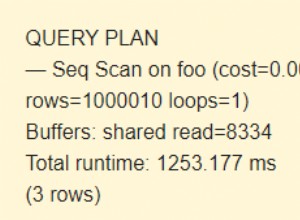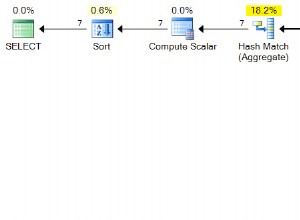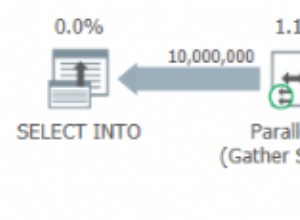In MySQL i database sono sinonimi di schemi . Laddove, ad esempio, in Postgresql puoi eseguire query tra più schemi in un database, ma non tra database (direttamente), puoi eseguire query tra più database in MySQL poiché non c'è distinzione tra i due.
In questa luce, una possibile soluzione alla tua query multi-database in MySQL potrebbe essere quella di utilizzare un unico motore, sessione e Base che gestiscono entrambi gli schemi e passano il schema argomento della parola chiave
alle tue tabelle o riflettendo entrambi gli schemi in modo che siano pienamente qualificati.
Dato che non ho i tuoi dati, ho creato 2 schemi (database MySQL) su un server di prova chiamato sopython e sopython2:
mysql> create database sopython;
Query OK, 1 row affected (0,00 sec)
mysql> create database sopython2;
Query OK, 1 row affected (0,00 sec)
e aggiunto una tabella in ciascuno:
mysql> use sopython
Database changed
mysql> create table foo (foo_id integer not null auto_increment primary key, name text);
Query OK, 0 rows affected (0,05 sec)
mysql> insert into foo (name) values ('heh');
Query OK, 1 row affected (0,01 sec)
mysql> use sopython2
Database changed
mysql> create table bar (bar_id integer not null auto_increment primary key, foo_id integer, foreign key (foo_id) references `sopython`.`foo` (foo_id)) engine=InnoDB;
Query OK, 0 rows affected (0,07 sec)
mysql> insert into bar (foo_id) values (1);
Query OK, 1 row affected (0,01 sec)
In Python:
In [1]: from sqlalchemy import create_engine
In [2]: from sqlalchemy.orm import sessionmaker
In [3]: from sqlalchemy.ext.automap import automap_base
In [4]: Session = sessionmaker()
In [5]: Base = automap_base()
Crea il motore senza specificare quale schema (database) utilizzi per impostazione predefinita:
In [6]: engine = create_engine('mysql+pymysql://user:example@sqldat.com:6603/')
In [7]: Base.prepare(engine, reflect=True, schema='sopython')
In [8]: Base.prepare(engine, reflect=True, schema='sopython2')
/home/user/SO/lib/python3.5/site-packages/sqlalchemy/ext/declarative/clsregistry.py:120: SAWarning: This declarative base already contains a class with the same class name and module name as sqlalchemy.ext.automap.foo, and will be replaced in the string-lookup table.
item.__name__
L'avviso è qualcosa che non capisco completamente ed è probabilmente il risultato del riferimento alla chiave esterna tra le 2 tabelle che causa il riflesso di foo, ma non sembra causare problemi.
L'avviso è il risultato della seconda chiamata a prepare() ricreare e sostituire le classi per le tabelle riflesse nella prima chiamata. Il modo per evitare tutto ciò è riflettere prima le tabelle di entrambi gli schemi utilizzando i metadati, quindi preparare:
Base.metadata.reflect(engine, schema='sopython')
Base.metadata.reflect(engine, schema='sopython2')
Base.prepare()
Dopo tutto questo puoi interrogare unendo foo e bar:
In [9]: Base.metadata.bind = engine
In [10]: session = Session()
In [11]: query = session.query(Base.classes.bar).\
...: join(Base.classes.foo).\
...: filter(Base.classes.foo.name == 'heh')
In [12]: print(query)
SELECT sopython2.bar.bar_id AS sopython2_bar_bar_id, sopython2.bar.foo_id AS sopython2_bar_foo_id
FROM sopython2.bar INNER JOIN sopython.foo ON sopython.foo.foo_id = sopython2.bar.foo_id
WHERE sopython.foo.name = %(name_1)s
In [13]: query.all()
Out[13]: [<sqlalchemy.ext.automap.bar at 0x7ff1ed7eee10>]
In [14]: _[0]
Out[14]: <sqlalchemy.ext.automap.bar at 0x7ff1ed7eee10>
In [15]: _.foo
Out[15]: <sqlalchemy.ext.automap.foo at 0x7ff1ed7f09b0>




